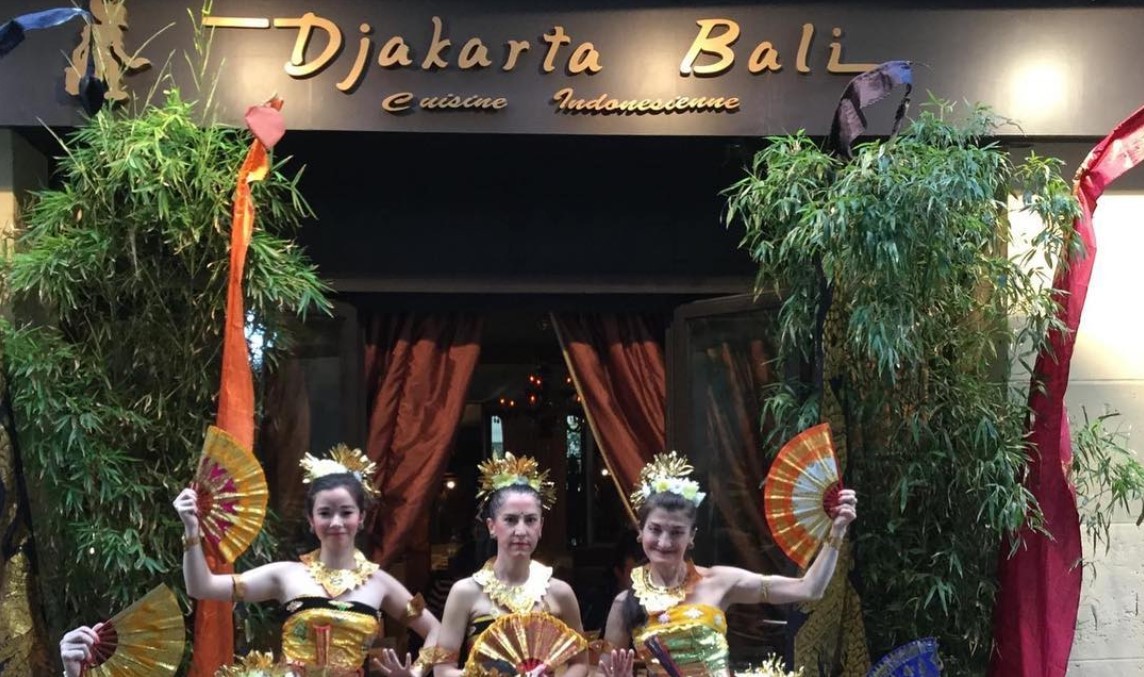Popular Reads
Top Results
Can't find what you're looking for?
View all search resultsPopular Reads
Top Results
Can't find what you're looking for?
View all search resultsDjakarta Bali: A love story once unrequited
While Indonesian restaurants are becoming more common abroad, Djakarta Bali in Paris has its own story.
Change text size
Gift Premium Articles
to Anyone
N
estled on a small street within the hustle and bustle of Les Halles area in Paris, Djakarta Bali has been an establishment where middle class and wealthy Parisians go whenever they need to escape the city for a while and relax while enjoying authentic Indonesian food without having to fly across the globe.
Adorned with palimanan stone on its walls, gamelan music, touches of batik, wayang and other Indonesian decorative elements, Djakarta Bali, which was founded in 1978, immediately welcomes its patrons with a whiff of aromatic Balinese incense, sending its patrons to another side of the world. Little did we know this place offers more than just good food: It also offers a fascinating story.
Nina Hanafi, owner of the restaurant, greeted The Jakarta Post at the restaurant’s peak dinner hour, 8 p.m. on a Saturday. We were seated in what seemed to be the star seat at a dimly-lit corner, where the wall featured a picture of a man seated with Indonesia’s first president, Sukarno.
“That’s my father, A.M. Hanafi. With Bung Karno, yes,” she said, as though she could feel the question coming.
Nina is the youngest daughter of A.M. Hanafi, ex-Indonesian ambassador to Cuba in the Sukarno era. Previously a member of the republic’s initiator group, Menteng 31, Hanafi was known for his comradeship with Sukarno, who gave him the “A.M.” or “Anak Marhaen" (child of Marhaen) before his name. Marhaen is a name that belonged to a farmer who inspired Sukarno in his Marhaenism ideology that aimed to better the lives of proletarians.
Read also: Les Ateliers de Paris incubator calls for international designers
A.M. Hanafi was appointed by Sukarno as the Indonesian ambassador to Cuba in 1963, before he was taken off his post and had his Indonesian passport inexplicably revoked in 1966, causing him and his family to be stateless.
After a while, the Hanafi family embarked for France with travel documents granted by the Cuban government under the Geneva Convention, where they were granted asylum. In 1978, Djakarta Bali was established in line with Hanafi’s aim to sustain his family, he also taught the Indonesian language.
“When I was little, Indonesia was a virtual place. My parents told me we once lived there. I ate nasi goreng (fried rice), kerupuk (crackers), and spoke to my family in broken Indonesian. And still it’s a virtual place, almost unreal,” Nina said.
“I was born an Indonesian citizen, but the country revoked my citizenship and I think that’s unconstitutional. I could have filed a lawsuit for this if I wanted to, but if I do that, it will never end,” she added.
Nina finally got the opportunity to visit Indonesia in 1994, as a French citizen. “I went to Indonesia that time because I really wanted to see the country. I was born in Cuba and lived in France, so I’d never been to Indonesia before that.”
“My parents were patriots, they participated in building the Republic. That is why they felt so heartbroken when I decided to take French nationality, also in 1994,” she said.
A.M. Hanafi and his wife, Sukendah, were finally granted their Indonesian passports back in 1999 when they were invited home by then president Abdurrahman "Gus Dur" Wahid after more than three decades banned from entering the country.
 AM Hanafi and Sukendah, at Djakarta Bali (Courtesy of Nina Hanafi/File)
AM Hanafi and Sukendah, at Djakarta Bali (Courtesy of Nina Hanafi/File)
The dishes arrived, featuring Indonesian classics; a piping hot portion of succulent ayam opor (chicken coconut milk stew), delectable sambal goreng ati (fried chicken liver with diced potato and beans) and comforting sayur lodeh (vegetable in coconut milk soup) served with warm, fluffy white rice. Paris suddenly dissolves into a distant blur; its vapors turning into familiar aromas of home.
“Most of our customers here prefer the rijstaffel ("rice table" or formal dinner) sampling menu in order to discover various Indonesian dishes,” Nina said. Djakarta Bali’s other specialties include rendang (Padang-style beef simmered in coconut milk and spices) and pepes ikan (steamed fish wrapped in a banana leaf) with cod fillet at the top of customers’ favorite list.
Having been featured in numerous international publications such as Gourmet, Zagat, Lonely Planet, Bottin Gourmand and more, Djakarta Bali has set its own gastronomic standards. Nina ensures quality and authenticity by importing spices such as candlenut, kaempferia galanga, bay leaves and curcuma leaves from Indonesia.
Nina is adamant about presenting traditional dishes in their most authentic form. “Our cuisine has standards that are different from European cuisine and focuses on the spices more than the product itself, even if products have to always be chosen for their quality. It’s ‘slow food’ cooked with time and love.”
Read also: Bumbu Truck: Bringing the taste of Indonesia to Americans
Djakarta Bali bears up Nina’s mission to present Indonesian gastronomy, which is not very well-known in France, as it is in the Netherlands. She is not in a hurry to expand or go fusion with the food she serves in the establishment. “A cuisine can go fusion once it’s well known and the guests have references about the original taste. For instance, Japanese sushi has many fusion versions because people have enough knowledge of the classic presentation and taste.”
She also adds that aside from authentic traditional Indonesian food, the restaurant also offers other tastes of Indonesian culture, such as traditional dance performances held almost every weekend.
“This restaurant is more than just a restaurant for us because it’s the thing that kept us together through all the hardships. Also, it’s what keeps us linked to Indonesia,” Nina stated.
“Although Indonesia has been very unfriendly to me and my parents, I was given enough knowledge to love Indonesian culture, which has become the soul of this restaurant. I run this place with so much love for Indonesia,” she said. (kes)











